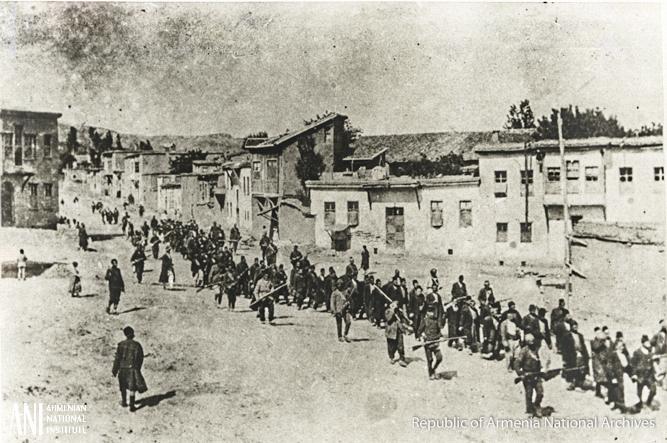“Accordingly, I have placed my death-head formations in readiness—for the present only in the East—with orders to them to send to death mercilessly and without compassion, men, women, and children of Polish derivation and language. Only thus shall we gain the living space (Lebensraum) which we need. Who, after all, speaks today of the annihilation of the Armenians?”
—Adolf Hitler, a week before the 1939 invasion of Poland
“That men do not learn very much from the lessons of history is the most important of all the lessons of history.”
—Aldous Huxley
This year is the 100th Centennial of the Armenian Genocide. It is believed that upwards of 1.5 million were killed while in the Ottoman Empire by forced death marches while being relocated en masse from eastern Anatolia to the Syrian desert and elsewhere. Further forced death marches to relocation’s camps and ongoing massacres of Armenians occurred between 1915–1918.
Because of a history of official denial by the Turkish government, Armenians across the globe have pushed for recognition of the tragedy, as well as some sort of amends.
LA City Councilmember Paul Krekorian, an Armenian-American, has made an announcement to the Epoch Times regarding events bringing awareness of the Armenian genocide:
“I’m also proud to be spearheading the City of Los Angeles’ sponsorship of events commemorating the 100th anniversary of the Armenian Genocide. As the first Armenian-American ever elected to city office in Los Angeles, I have always pushed to highlight the city’s commitment to human rights and justice.
“Los Angeles is committed to recognizing the Armenian Genocide and educating people throughout the city about our continued struggle for justice. There will be an extraordinary exhibit at the city’s Central Library that highlights America’s generous support for the Armenian people, along with banners advertising the ‘March for Justice’ across the city. The winners of my Centennial Art Contest will be revealed and their art will be displayed on buses throughout the city. Because of my efforts, we will also light City Hall in a purple glow to symbolize forget-me-nots, display art commemorating the centennial on city buses, and plant 100 pomegranate trees throughout LA’s parks. This is an unprecedented commitment by Los Angeles to our community and to telling our story. I’m proud to have helped make it happen.”
The Epoch Times had a chance to interview Councilmember Krekorian.
SBB: You have made several trips to Armenia. What were the nature and goals of those trips?
PK: The goal of my travel to Armenia was to see the land of my ancestors and to create greater cultural, political and economic connections with Armenia and the United States, specifically the state of California and the city that I represent, Los Angeles. I brought with me a delegation of city and statewide elected officials, who learned a great deal and participated in important events.
SBB: And what were the results of those trips?
PK: It resulted in amazing cultural exchanges, new learning experiences and a deepening of my resolve to advocate for the causes of justice and recognition for my community. The travel was important for me and my family as well.
SBB: Why do you think the government of Turkey historically has refused to bring closure to this documented genocide by admitting to its true history?
PK: There is a lot of history there. While I think the people of Turkey are willing and ready to make amends with their country’s past, the governments, both past and present, have been less willing.
SBB: What do you feel would be the first step in resolving this historically significant issue? And why do you think international courts, such as the ICJ in Belgium, are not bringing this cause into their courtrooms?
PK: I think it is just a matter of time before we win the recognition we deserve. The tide is turning in the United States and internationally because of the tenacious advocacy of the Armenian people in Armenia and in the diaspora, and because people are becoming more aware of human rights issues. We are an important part of the global village, which is more connected than ever before. I think that helps.
SBB: What can concerned citizens of any nation do to resolve this important problem?
PK: They can learn about the issue and talk to their friends and neighbors about the need for recognition. They can also stand with Armenians everywhere on April 24 and demand justice with us. Solidarity is very important. The larger and more diverse the movement becomes, the sooner we will achieve our goal.
Question for our readers: If and when there are government-activated holocausts inflicted on groups or peoples in the future, who here, now amongst us will be able to say, “I spoke up for those being tormented?”
Shelley B. Blank has worked with major national and international newspapers as a journalist as well as a corporate executive. He has produced programs for Public Radio and lectured on modern multimedia communications and technology.



